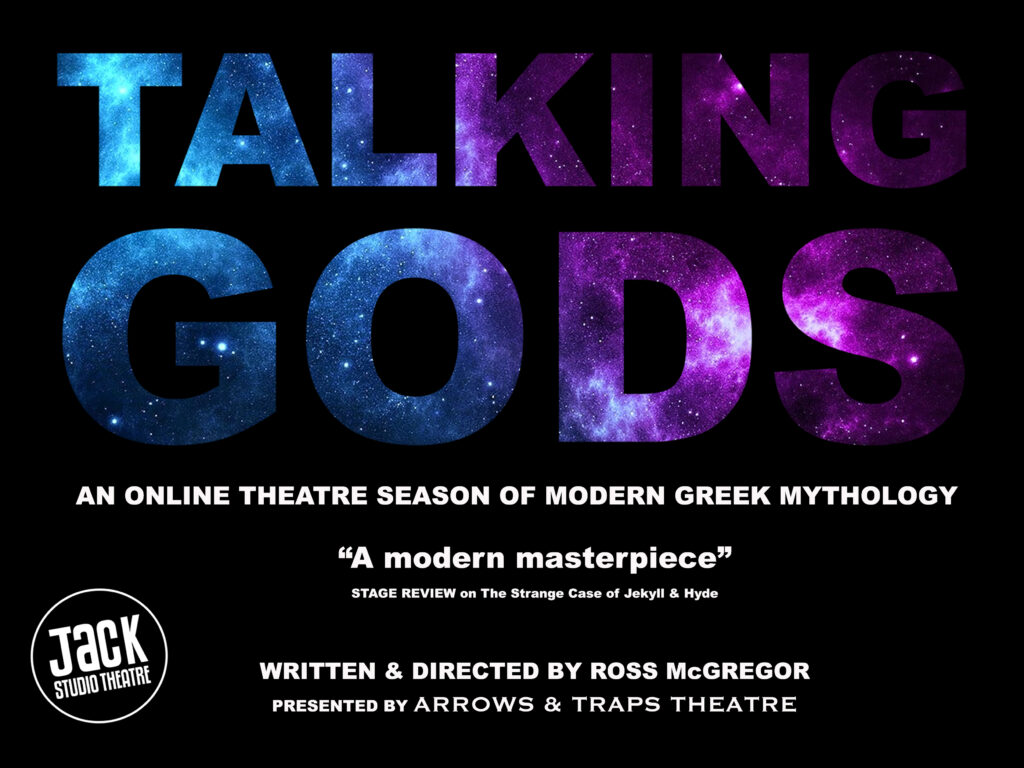Free online from 5 April – book via https://www.arrowsandtraps.com/talkinggods
Reviewed by Claire Roderick
4****
Arrows & Traps’ online festival of reimagined Greek myths premieres this week, with the gods and nymphs inhabiting the modern world as they play out the familiar stories. Writer and director Ross McGregor weaves wonderfully emotive but funny tales about very modern, very human, heroes – the tone is set by the tongue in cheek introductions and, as usual, the music choices are inspired.
Persephone
4****
Zeus is on trial, and Hestia, goddess of home and hearth is called to give evidence. After introducing herself, as she’s sure that nobody remembers her, she is asked why she chose to leave Olympus, and Hestia and her sister Demeter tell their story. Freed from captivity inside their father only to be controlled and abused by their rescuer and brother Zeus, the sisters leave so that Demeter can raise her child in safety.
Demeter, goddess of the harvest is a dedicated campaigner trying to save the planet, even though nobody is listening, but her love for the planet doesn’t always extend to the humans destroying it, as she relates with glee the gruesome revenge she inflicted on a property developer who chopped down her sacred trees. Hestia, meanwhile, is gentle and conciliatory, setting up a bespoke central heating company to support the family and their home. The unexpected and fierce love that Demeter feels for her daughter sets them at loggerheads as Cora grows up, embarrassed by and uninterested in her mother’s campaign, and the harder Demeter fights to hold on to Cora and keep her safe from harm, the further away she pushes her, until, after realising that her first boyfriend Apollo is a complete dick, Cora meets Hades and disappears, leaving Demeter frantic and bereft.
Nicolle Smartt plays Hestia, Demeter, and her daughter Cora, with a stylish change of lighting and costume to mark the characters – warm glows of red for Hestia, green and leather for Demeter and purple for Cora and her phone. Smartt’s performance doesn’t really need any visual help as she portrays the three different characters expertly, capturing the fierceness of Demeter, Hestia’s warmth, and Cora’s distracted restlessness effortlessly and convincingly.
The heart of McGregor’s story is the love between the women, forged in the darkness of their imprisonment, and the effects of the gods’ twisted family dynamics on Demeter’s maternal love and Hestia’s quiet, unwavering love and support for Demeter as her grief brings winter to the world. McGregor excels at writing multi-layered female characters, and these three are fascinating. There are many references to capitalism, ecology, climate change and social media, but the messaging is relevant and necessary and never overdone, and the troubles the goddesses have on earth are all relatable. Smartt is devastating in the brilliantly written scenes focussing on Demeter’s and Hestia’s torment and worry when Cora leaves, and the darker, more sober tone remains until the end of the film.
McGregor’s intelligent and sensitive writing and Nicole Smartt’s incredible performance breathe new life into the ancient myth – fantastic storytelling and an impressive start to this series.
Orpheus
4****
Beginning at the end of the story, we first see Eurydice and Orpheus on their journey out of the underworld – on a train to London. Orpheus writes on his hand, showing no sign of dooming his wife to remaining in the underworld by turning to look at her, and Eurydice turns to the camera to explain how this all came about.
Meeting at a student union theme night, Eurydice (Charlie Ryall) and O (Christopher Neels) begin a relationship. Eurydice is a nymph heading for a double first in agriculture, and O is studying medicine, but his passion is music. After a hilarious night of clueless seduction and Mars ice creams, the two begin a relationship that is heading for disaster. O’s music has magical effects on humans and animals, and he insists Eurydice is his muse and drops out, spending all his time on his song writing while she supports them both. She is slowly and irreversibly isolated from everyone else in her life as her man child husband begins to find success. The gaslighting becomes more obvious as they argue more often, with O always able to shift the blame onto her, never taking responsibility or facing consequences for any of his actions. Eurydice fatalistically admits to the camera that she wanted the magic but didn’t want to know the trick as she realises what her life has become while the camera work and editing get jumpier as Eurydice’s mental health declines. After O finds phenomenal success using every intimate detail of Eurydice’s life in his songs, and she discovers what he’s been up to on tour, Eurydice kills herself and finally finds peace in the underworld. Until Orpheus turns up.
McGregor’s script is sharp and witty, veering from laugh out loud lines to jaw-dropping despair in a heartbeat as the story of Eurydice’s escape from this toxic relationship unfolds. Charlie Ryall is wonderful as Eurydice – vulnerable but whip smart (oh that final shot!) – while Christopher Neels is utterly slappable as Orpheus. The story is punctuated by a brilliantly eclectic mix of musical numbers, with stunning vocals from Sam Morgan-Grahame as Orpheus that mark the progress of their relationship and sprinkling a little more magic into this already fascinating film.
Pygmalion
4****
In Greek myth, Pygmalion fell in love with a marble statue he’d created, in Arrows & Traps’ new version, Pygmalion is a game designer and Galatea is a rogue algorithm.
Pygmalion (Edward Spence) lives a life of isolation – screening calls from his mother and following the same routine every day with only Ratbag – a virtual assistant and therapy app – for company as he works on his games.
Summoned by Aphrodite (Benjamin Garrison), Pygmalion is given the job of designing a game as the goddess’s wedding gift to her son – one where she can enjoy watching him beat up heroes. As he starts work, Galatea introduces herself. After realising that he cannot delete her, Pygmalion reluctantly agrees to complete a quest in the game with Galatea, as only completing the final scene will switch off her program – and he begins to wonder if this is Aphrodite’s punishment for disrespecting her.
Pygmalion’s journey from animosity to love with Galatea is a joy to watch as he slowly lowers his defences seeing his computer world though fresh eyes as Galatea delights in each new experience – with lots of unnecessary stabbings and chicken kicking thrown in. Edward Spence does wonders as Pygmalion – filmed mostly in closeup and full of nuance in between meltdowns, while Gabrielle Nellis-Pain and Richard Baker are entertaining as Galatea and Ratbag. Writer and director McGregor
doesn’t rush things, allowing quiet moments in between the comedy questing that contrast the vitality that Pygmalion has online with him IRL. The reasons for Pygmalion’s isolation are unclear, with videos of him and his ex in happier days hinting at loss. It’s only after a heart to heart with Terry the Minotaur that we understand why Pygmalion retreated from the world, and it is Terry’s advice, including an excruciatingly detailed account of his insane conception, that gives Pygmalion the courage to acknowledge his feelings. The ending is surprisingly emotional, and the film resonates as we all find our way blinking into the light of the pub garden and learn to socialise offscreen again. Touching and surprisingly hopeful, Pygmalion is another impressive piece in the Talking Gods series.
Premiering nightly at 7.30, then on demand: https://www.arrowsandtraps.com/talkinggods
Persephone – Monday 5th April
Orpheus – Tuesday 6th April
Pygmalion – Wednesday 7th April
Aphrodite – Thursday 8th April
Icarus – Friday 9th April



